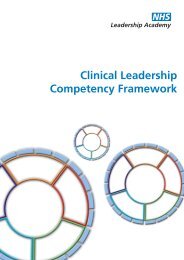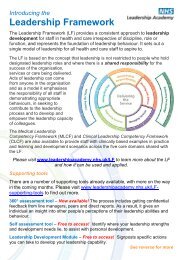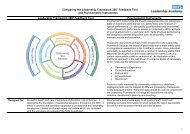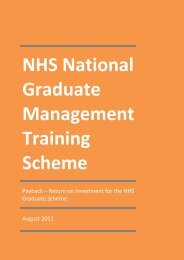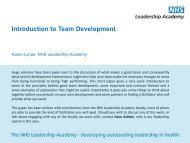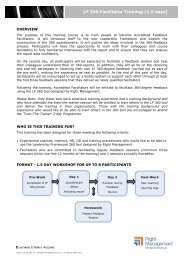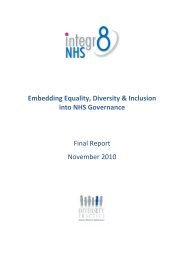Healthy NHS Board: a review of - NHS Leadership Academy
Healthy NHS Board: a review of - NHS Leadership Academy
Healthy NHS Board: a review of - NHS Leadership Academy
You also want an ePaper? Increase the reach of your titles
YUMPU automatically turns print PDFs into web optimized ePapers that Google loves.
2012, Committee on Standards in Public Life, 2013)<br />
audit committee activity (Financial Reporting Council,<br />
2012), and the organisation’s governance arrangements<br />
(Institute <strong>of</strong> Chartered Secretaries and Administrators,<br />
2011). Such transparency is identified as a valuable<br />
means <strong>of</strong> engaging with stakeholders, and increasing<br />
levels <strong>of</strong> stakeholder trust.<br />
In terms <strong>of</strong> internal accountability, there is an increased<br />
focus on systems to support staff raising concerns about<br />
quality (National Quality <strong>Board</strong>, 2011), for example<br />
through a ‘whistleblower policy’ (Pr<strong>of</strong>essional Standards<br />
Authority, 2012, Monitor, 2010b, Francis, 2013), and<br />
acting against any practices that might prevent raising<br />
<strong>of</strong> concerns (Pr<strong>of</strong>essional Standards Authority, 2012).<br />
These principles are also supported in commentary<br />
based on research on organisational culture (Davies and<br />
Mannion, 2013). <strong>Board</strong>s should receive and analyse data<br />
on how management addresses performance issues,<br />
as opposed performance data itself: this may support<br />
boards in gaining an effective understanding <strong>of</strong> how<br />
management operates while retaining suitable distance<br />
from operational decisions (Storey et al., 2010b).<br />
As described in our original <strong>review</strong>, risk assurance and<br />
risk management are important components <strong>of</strong> ensuring<br />
accountability (Moore, 2013, Storey et al., 2010a,<br />
Healthcare Financial Management Association, 2011).<br />
Risks should reflect strategic objectives and controls<br />
should be in place to address these risks appropriately<br />
(Healthcare Financial Management Association, 2011).<br />
The assurance framework is an important tool by which<br />
boards monitor progress against strategic objectives<br />
and identify significant risks. It should be supported by<br />
suitably robust systems that allow risk to be identified,<br />
assessed and prioritised. The framework should specify<br />
the sources <strong>of</strong> assurance (such as process and outcome<br />
data), who provides the assurance (whether the<br />
provider is internal or external, the provider’s expertise<br />
and experience), and how the assurance was obtained<br />
(approach and timing <strong>of</strong> data collection). Data quality,<br />
in terms <strong>of</strong> validity, completeness and currency, should<br />
also be considered. Such systems are likely to vary from<br />
organisation to organisation, reflecting organisational<br />
context and priorities. It is the task <strong>of</strong> the Audit<br />
committee to assure the board <strong>of</strong> the assurance system’s<br />
robustness. Based on this information, the board’s<br />
role is then to decide what level <strong>of</strong> risk is acceptable,<br />
reflecting the organisation’s ‘risk appetite’ (Healthcare<br />
Financial Management Association, 2011).<br />
Alongside assurance on such matters as quality <strong>of</strong><br />
care and productivity (Monitor, 2013), it is also now<br />
recommended that the board is suitably informed <strong>of</strong><br />
how organisational culture is experienced by patients,<br />
staff and other stakeholders (Alimo-Metcalfe, 2012,<br />
Francis, 2013, Monitor, 2013). This may be achieved<br />
using tools, such as a ‘cultural barometer’, to provide<br />
assurance that the organisation has a healthy culture<br />
(Francis, 2013). However, research on culture outlined<br />
in our original <strong>review</strong> suggests such an approach should<br />
be applied with care: organisational culture is complex<br />
and multifaceted, making measurement challenging;<br />
further, efforts to change culture may bring about<br />
unintended consequences (Davies and Mannion, 2013,<br />
Scott et al., 2003a, Scott et al., 2003b).<br />
Turning to how boards might best engage with<br />
this information, triangulating qualitative data with<br />
quantitative data is recommended as a useful way for<br />
boards to give hard data a ‘reality check’ and thus gain<br />
a meaningful understanding <strong>of</strong> organisational activity<br />
(Monitor, 2010b, Dr Foster Intelligence, 2010, Dr Foster<br />
Intelligence, 2011). Also, boards are warned that an<br />
excessive focus on monitoring can lead to ‘managerial<br />
myopia’ and distract from good strategy (Chambers et<br />
al., 2013).<br />
In <strong>NHS</strong> Foundation Trusts, governors’ role in ensuring<br />
accountability is increasing. Governors will be<br />
required to hold Non-Executive Directors to account<br />
for performance <strong>of</strong> the board, and may request that<br />
directors attend a governors’ meeting to provide<br />
information on how the board performs its duties<br />
(Monitor, 2012b). These new roles reflect the potential<br />
value <strong>of</strong> governors as a support <strong>of</strong> wider healthcare<br />
regulation (Wright et al., 2011).<br />
Recent research carried out in Foundation Trusts<br />
indicates that governors only engage with their current<br />
accountability duties to a limited degree (Allen et al.,<br />
2012a, Ocloo et al., 2013). To address this, research<br />
recommends that boards empower their governors,<br />
ensuring they have suitable levels <strong>of</strong> training and<br />
information to carry out their duties (Ocloo et al., 2013,<br />
Wright et al., 2011).<br />
www.leadershipacademy.nhs.uk 17



